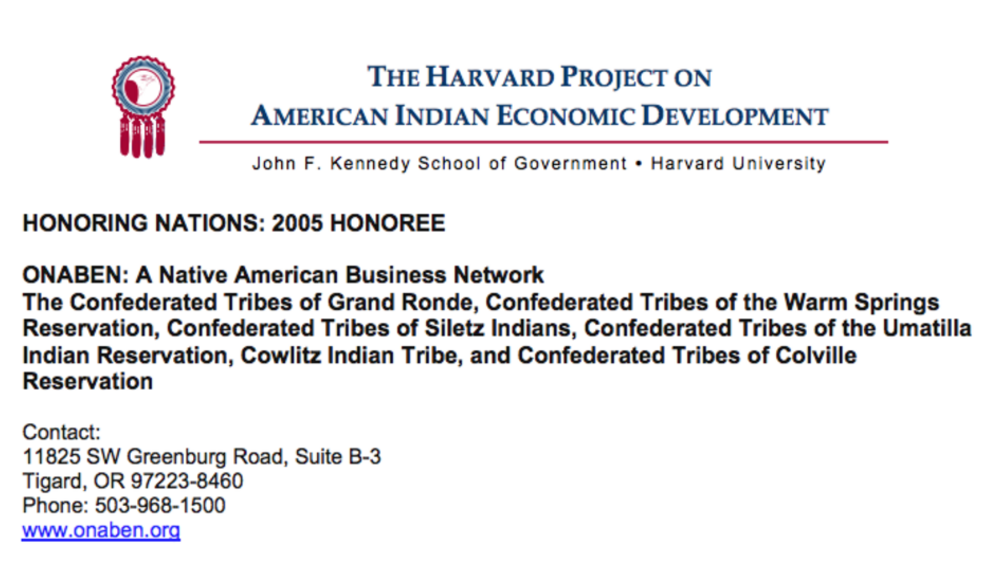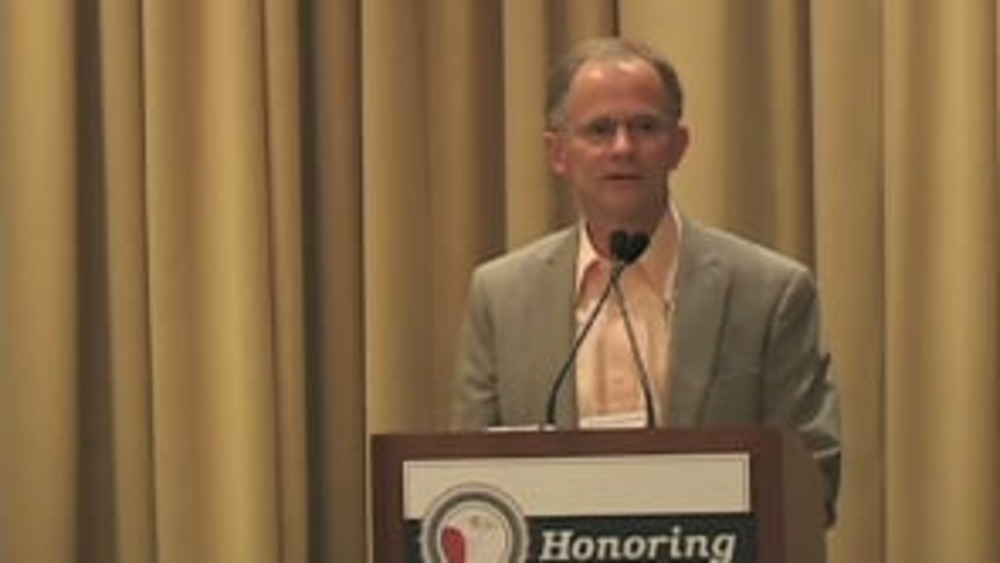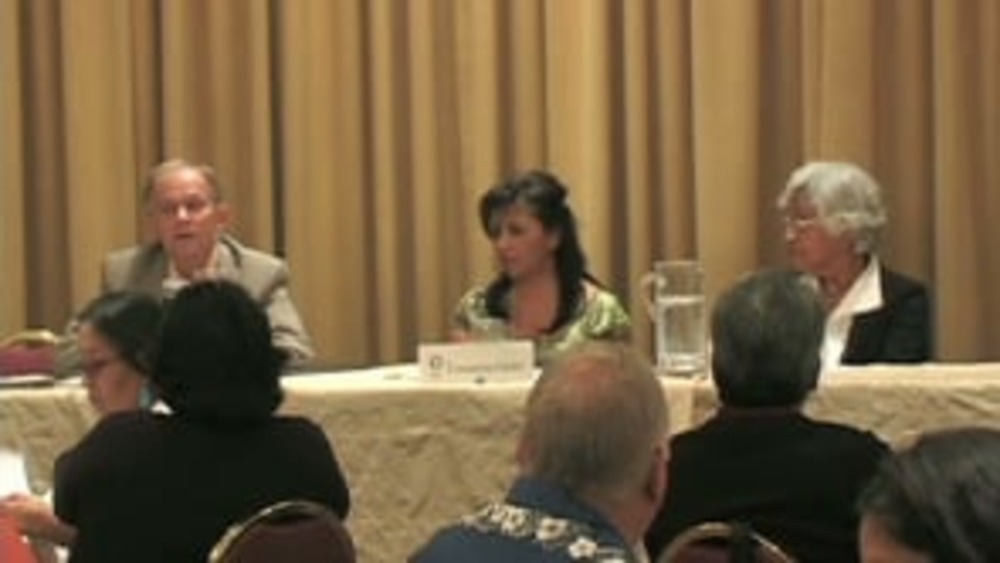Former Executive Director of ONABEN Tom Hampson presents an overview of the organization's work to the Honoring Nations Board of Governors in conjunction with the 2005 Honoring Nations Awards.
Additional Information
Hampson, Tom. "ONABEN: A Native American Business Network." Honoring Nations Awards event. Harvard Project on American Indian Economic Development, John F. Kennedy School of Government, Harvard University. Tulsa, Oklahoma. November 1, 2005. Presentation.
Transcript
Tom Hampson:
"It's a great privilege and an honor to be here. My name is Tom Hampson. I'm Executive Director of ONABEN, a Native American Business Network. I want to thank the Harvard Indian Economic Development Project Honoring Nations, but particularly Amy [Besaw] and Jackie [Old Coyote] and the site review team of Jonathan Taylor and Joan Timeche. One of the most unexpected outcomes of this process was the fact that you guys were so professional as both counselors and cheerleaders and colleagues and now friends that as we work on projects together I'm sure in the future that this has been a real exciting process for us. [Thank you.] We'd not be here if it were not for the support of the guidance of our board of directors, who believe in our mission. Of course we would not be here at all if it had not been for the opportunity to serve Indian people as chartered by the sovereign nations that we serve. I'd like to list those: Confederated Tribes of Grand Ronde, Confederated Tribes of Siletz, Umatilla, Warm Springs, Colville and Cowlitz and some ten other tribes that we have done programs and associates with. I'd like to recognized Chairman Dolores Pigsley of Siletz who is here in the audience, Board of Trustees Chairman Antone Minthorn of Umatilla, Colville Business Council Chairman Harvey Moses, Jr., Sal Sahme of Warm Springs Economic Development Department and David Tovey of the Coquille Tribe and Umatilla enrollee. Dave is also a former ONABEN board member and represents the Economic Development Corporation of the Affiliated Tribes of Northwest Indians, and ATNI itself is the mother ship, which has been a very important and critical strategic partner for us as ONABEN has grown.
The evolution of ONABEN over the last 14 years represents a mix, a mix of opportunities, of Indians, of non-Indians, of tribal leaders and entrepreneurs, of technocrats and hundreds and hundreds of wonderful people and those of the Native American entrepreneurs, or as we have corned the term "Indianpreneurs." It is a mix that mirrors that marketplace in which we all must participate and in which we all must compete. ONABEN was chartered in 1991 by a guy named Mitch Connelly, who at the time was the Director for the Spirit Mountain Community Development Corporation, or Economic Development Corporation, for the Grand Ronde Tribe. And Mitch persuaded four Oregon tribes that it was in their interest to integrate their economic development strategy to include the kind of diversification and energy that can only come from creating a private sector on the reservation. And thus, the coalition of tribes was born in Oregon with the mission to enable Native Americans to realize their dreams for a better quality of life through owning and operating a small business, to strengthen Native American communities by building Native American confidence in their abilities to start and run businesses, to create comfortable and safe environments in which people can explore their dreams, to foster relationships which increase business survivability, and to contribute to the well being of the Native and non-Native communities around the area. That's an expansive and a very integrative kind of mission for an organization. And it was -- as you might think in the pre-gaming era -- a time in which discretionary income with tribes was very scarce and yet those tribes chose to make an investment not only in an intertribal organization, but most importantly in the creation of a small business center on their reservation, which was a prerequisite for joining the organization.
The organization has a service delivery model that is simple in concept, but very complex in operation as all intertribal organizations are. It features a network of...a small network staff to provide curriculum, provide expertise and support services to tribally run and operate its small business centers on the reservation. Over the years, we've discovered a number of principles that we think any Indianpreneurship program ought to have: that we need to provide services at the local level to match the entrepreneurs in that economy, in that place, in those industries and at that level wherever they are, given their level of aspirations, given their level of expertise, meet them where they are and provide environments in which they can explore their ideas, whether it's home-based businesses, expanding businesses, high-growth businesses, artists to engineers, contractors to inventors. The whole notion is to build a community around the entrepreneur and to integrate the tribe's economic development program with the individual private sector development. This all puts a lot of pressure on the network to make all of those forces happen, and because it comes down to building relationships that transcend these boundaries.
At the network level we are a content provider, a bridge builder, a product and service innovator and policy advocates to the tribes. Our classes are taught by entrepreneurs, independent business owners themselves from the local level that are selected by and in concert with the local tribe. These folks are local bridge builders to the local economy. In most recent years, we have focused our efforts on curriculum development for all levels of entrepreneurship and we're very proud to announce that as of November the 15th when we hold our annual conference Trading at the River, we are going to unveil our "Indianpreneurship: A Native American Journey into Business," our own branded curriculum based upon the stories of ONABEN clients. We support small business center managers in the tribe in evaluating and developing the most appropriate support systems for their private sector. We scan the environment for the best ideas and help the tribal managers apply them if it's appropriate to them. We bring federal, state, intertribal foundation, private sector resources to these collaborations.
So what has changed since ONABEN has been around? When I first came to the Confederated Tribes of Umatilla Indian Reservation in 1972, it was just after a grand economic development plan to utilize the land claim settlement money for tribal enterprises had been thoroughly trashed by the electorate in favor of disbursements to per capita payments. The confidence level by the people was very low in the tribe and in themselves to pull themselves up by anything, bootstraps, moccasin ties and let alone an economic development plan. But as a student of my mentors, I listened to the stories of the prosperous times before contact and even into the early reservation period where rich traditions of trade and economic gardening supported the people. We went to work to recreate in some modern form the prosperity of those days. Visionaries like Antone [Minthorn], planners like Mike Farrell and project managers like Dave Tovey and hundreds more like them across the country went to work and sustained this renaissance for the last 30 years.
There were very few small businesses on the reservation in the 1970s when we started, but that began to change as the tribe's prospects began to change and I'm sure it's the same where you come from. As the more the tribe has succeeded, the more the confidence is built, the more you see people going into business for themselves. The length between tribal economic development and individual private sector hold the next key to this renaissance. We believe that organizations like ONABEN, the Lakota Fund, Oweesta, Four Bands, all represents opportunities to play an important part in foraging these linkages, individual entrepreneur to tribal enterprise to local, regional, global marketplace. I think...but we got to do it I guess by going back is the other thing that we have discovered and I think Bill Yellowtail, who will be a speaker at our conference this coming in November says it best. He says, 'It is only circling back to the ancient and the most crucial of Indian values and understanding that the power of the tribal community is founded upon the collective energy of strong, self-sufficient, self-initiating entrepreneurial, independent, healthful and therefore powerful individual persons, human beings, Indians.' We exist to celebrate the accomplishments of these Indian business owners, their enterprise managers and the tribal councils that support them.
Trading at the River embodies the philosophy that we can look back to go forward, we can listen to stories from people like Mike Marchant who can talk about the collection of salmon at Kettle Falls, the drawing and bundling of those fish and the transportation over to the Buffalo Country, to stories from Antone and others about the berry fields of Mt. Adams, the fishing platforms of Celilo, where people met and traded and made connections that lasted forever. Trading at the River allows us to come together and ask the difficult questions of how we can move forward. At Trading at the River, we dedicate ourselves to the question that Antone has asked for the last 30 years of 'what is an Indian economy? What is Indian economic development? What does that mean?' We don't know the answer to that question, but we know the people who will and those are the entrepreneurs, the tribal leaders, the enterprise managers. Our role is to keep the conversation going, to disseminate knowledge, and to keep the magic of the network alive, vital and growing. Our job is to help build a community of traders, people of commerce, Indian entrepreneurs. The journey has been going for a long time and we are looking forward to the next stage and we want to share it with you. The people of the Harvard Project have affirmed our work, your recognition has humbled and inspired us. Thank you very much."
Amy Besaw:
"We'll have a few minutes of question and answers. As we're doing the question and answers, if Flandreau would come up here and join us at the side of the stage that would be great. Thank you."
Elsie Meeks:
"My whole career and life and work has been about supporting entrepreneurship and allowing Natives to become entrepreneurs, and at the same time I really feel like it's important that through this there starts to be changes made at the local level in a real, systematic way. And my only real question about ONABEN, and I'm very familiar and you guys work really hard and you've done really good things, but how rooted in the community and how much difference does it make at each tribal level, and I guess the other kind of question around that is how much ownership do the tribes feel to this or is this just a regional organization that serves tribes?"
Tom Hampson:
"That's the essence of the question, I mean that's the essence of our management challenges, and it's true for every network kind of organization, 'cause there's always the natural tension between the intertribal network and the individual members of that network and how much autonomy does each one have, and so it's all about relationship building. And there's no question that just like business development or economies in general, they vary from place to place. We've had extremely positive and strong relationships and support at say for example the Grand Ronde Tribe, and then as inevitably happens, you get the winds of political change, bring a new council with new priorities and some programs are favored and some are not. That program was completely terminated about three years ago at the tribal level. We maintained our relationship with the tribe to provide the same classes and counseling using the same people actually as a contract basis, and we're seeing the Grand Ronde tribe's interest in that program rekindle and we see cycles like that all through Indian Country. The most critical part of that is that, and this is why if all we're doing is just putting on classes to whoever asks us to put on classes or send out workshops consultants or whatever, is to insist that the tribe make the investment in creating a small business development center of its own. Now those folks, they do all kinds of things. They just don't counsel entrepreneurs. They inevitably get drawn into, based upon whatever department they're located in, into the priorities of those departments and the priorities of that tribe so the small business center manager Kathleen Flanagan at Umatilla is working on a small business incubator program. She's doing cash-flow analysis for an enterprise for Wild Horse Resort. So she'll split her time as directed by the tribe. And so the ONABEN programs in entrepreneurship are only a partial priority but most importantly though they are a priority and sometimes it's lower and sometimes it's higher. Our job is in a diplomatic way as possible to try to encourage those tribes to elevate those priorities and that's what we've seen. I think more lately what we've seen the power of something like Trading at the River to do is to get in the policy makers' heads the importance of entrepreneurship as a tribal economic development strategy not just as a bunch of individual businesses that are always harassing them at council meetings about not getting enough tribal work. So we're seeing a change in that perspective at the policy level. But as you all know it's a very delicate walk to take."
David Gipp:
"Dave Gipp here. I had a question. What distinguishes ONABEN's efforts from other regional, tribal or even state strategies toward successful economic development? What makes your project and your strategies distinctive I should say compared to other regional or tribal or even state strategies?"
Tom Hampson:
"I think it's that process that we've just described. The metaphor for that process is or the catch phrase is Walking the Talk. Because we don't staff up, there's only four of us in the central office, sometimes three, sometimes five depending upon our funding sources. We have to depend on independent contractors to provide the bulk of the services and the tribal centers and so we have to facilitate a relationship between an instructor, for example Lou Blake, an MBA, Stanford MBA, ex-entrepreneur, sold out his company, moved from Seattle to Matheau on the Colville Indian Reservation, now drives over three mountain passes to teach classes at Nespelem. Lou represents an individual in a marketplace and another culture and a whole body of knowledge that he brings to that place, to those people and a whole new perspective. If he were a tribal employee, if he were our employee, he would not be the same person, he would not bring the same perspectives, and I think that's one of the unique factors. The other factor about that is from just a pure survival point of view has an organization is if our funding sources are reduced, we reduce the number of independent contractors we use and the number of classes that we can provide. So we can flex up and down and I think that...we try not to build empires, we try to build relationships and strategic alliances so we get the work done. We do a lot of work...it used to be that the small business development centers in Oregon particularly didn't serve Indians at all. And now when we go into a community like at Coquille, Coos Bay, Southern Oregon, we will immediately contact the SBDC, have them help us hire instructors, get them to co-sponsor our classes so that our constituents know that they have a whole group of resources that are available to them. So we try very much to walk our talk in terms of boundary expanding as well."



